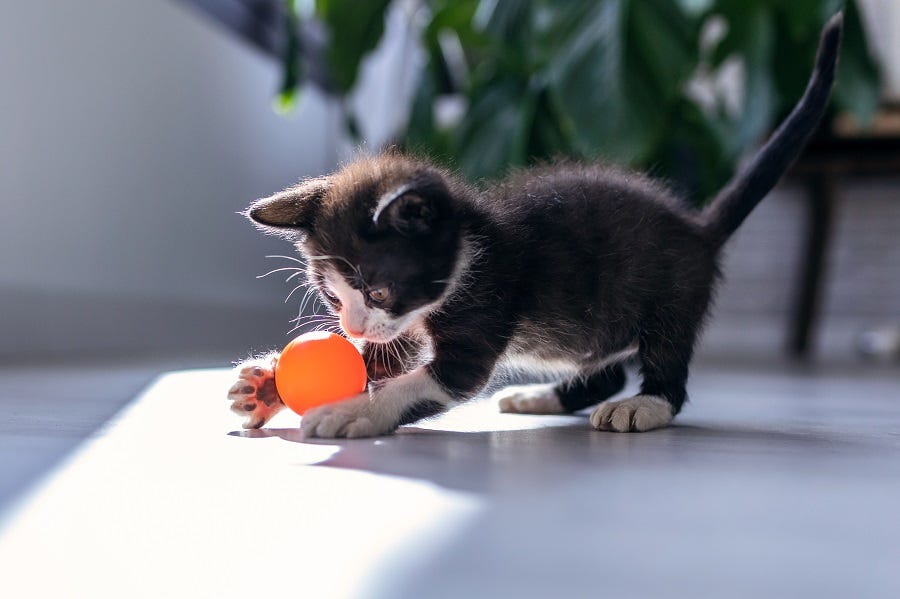There’s nothing a kitten loves more than playtime. Whether it’s doing zoomies around the house or stalking a (fake) mouse before they pounce on their prey, play is an important part of their lives. But kitten playtime isn’t all fun and games, it also helps them develop life-long skills they’ll carry into adulthood.
Encouraging the right type of play is essential in helping your kitten grow strong and healthy. Here’s everything you need to know about playing with your new feline friend.
Why is play so important?
Kittens figure out a lot about life through play. They learn to pounce, attack, climb, chew and other behaviours that are key to their survival in the wild. While our domesticated friends don’t necessarily need these skills to hunt down their packet food off the shelf, this instinct is still strong. Play is the perfect outlet to help burn off this energy, and can also help calm a hyperactive kitten.
Play is also great for socialising your kitten with other cats, animals and humans. Through play with their littermates, they learn how hard to grab, where to bite and important boundaries and limitations that will help them develop self-control. Plus, it’s also great for their physical kitten health. Specific toys are designed to aid and support different aspects of kitten health.
Plus, kitten exercise is perfect for burning off their seemingly endless energy. Play can be used to train and also decrease destructive behaviours, like scratching furniture and marking outside the litter box.
The best kitten toys for your feline friend
Kittens love a variety of toys when they play. Smaller objects that they can easily grab onto or move with their paws are great to help them express their hunting instincts. Think toys like wands with feathers or a stuffed animal that can be pulled along to mimic an animal, encouraging stalking and preying behaviours. You might also find that young kittens love to play fetch with a small toy or even a ball they can bat across the floor.
Avoid using your hands as a toy when you play. Not only will you end up littered with cat scratches, but it also gets them into the habit of seeing hands as toys.
Larger toys like a kitten scratching post are a great way to encourage your kitten to sharpen their claws without taking it out on your furniture. Plus, towers and cat trees are great to get them stretching, moving and jumping. Make sure to play carefully and monitor them to ensure they don’t jump from a height that could hurt them.
Kitten teething toys
As your kitten begins to teethe, you might find they begin to bite. Just like human babies, this process can cause plenty of discomfort and pain while their adult teeth grow in. Teething toys are the perfect tool to help alleviate some pain, while also avoiding your kitten biting furniture, plants or even your hand.
How long should I play with my kitten?
Some kittens will love to play and play, seemingly without a break! However, it’s generally recommended you play with your kitten for just 20 minutes a day. That time alone will provide them with the physical and mental stimulation they need, while also boosting the bond between you and your pet.
As for timing, it’s generally best to set aside time for two play sessions a day – in the morning and night. You might find that if you play with your kitten before bed, they’ll be ready to sleep when you are, and you’ll avoid waking up to nibbles on your toes! It will also prevent a bored kitten from wreaking havoc during the night.
Kitten behaviour to look out for during playtime
Remember that play is all about learning, which means your kitten will likely be excited every time you pull out their favourite toy. However, there are a few play behaviours that you’ll want to try and stop quickly, such as:
- Biting
- Clawing
- Chewing
- Aggression
While some of these behaviours, like biting, aren't a huge issue when they’re tiny, as they grow their claws and teeth can result in some painful injuries. If your kitten gets rough during play, it’s best to stop and move away. The less attention they get, the less likely they are to repeat the behaviour.
Once you’ve given them a minute to calm down, try and redirect the behaviour with a toy. If your kitten immediately starts to play with the toy, reinforce good behaviour with a treat.
How to keep kitten playtime safe
It’s important to make sure you help keep your kitten safe as they begin to learn through play. There are a few things to keep in mind:
- Avoid choking hazards: Make sure small items like hair ties, bottles and rubber bands are never used as playthings. Keep small items up and away from curious paws.
- Keep playtime short: Keep play sessions to 10-20 minutes to make sure you don’t wear out your cat.
- Inspect toys: Make sure your kitten’s toys don't have any small parts like eyes or buttons that they can pull off and choke on.
- Beware of toxic toys: If your kitten’s toys smell of chemicals, don’t give it to them.
Ensuring that play is a priority during your kitten’s developmental stages is key to helping them grow up fit and healthy. Whether your furry friend prefers to chase a mouse along the ground or traverse a cat tower, there are no limits to the way you can play with them.
Kitten Play FAQ
How to stop a kitten from biting?
Never encourage play with your hands or feet. Your kitten will learn pretty quickly that hands and feet are boring toys! If they do start to bite, stop the play for a few minutes to let them calm down. Then, try and redirect their attention to one of their favourite toys.
How to train a kitten to use a scratching post?
Some kittens will automatically be drawn towards a scratching post, while others will need a little more coaxing. Try and encourage play around the scratching post with a wand toy. Flick the toy towards the post, encouraging your kitten to place her paws on the post.
When in doubt, pull out the treats. If your kitten sniffs or shows interest then reward them with treats. Keeping rewarding them as they show interest before they work their way up to scratching.
How much exercise should a kitten get?
Kittens are very different from puppies – one thing they have in common is the need for regular exercise. To start, keep dedicated play time to about 20 minutes a day. You’ll find that your kitten is a lot more active and will generally look after their own exercise, especially if they have another feline friend to play with and chase around the house.
























